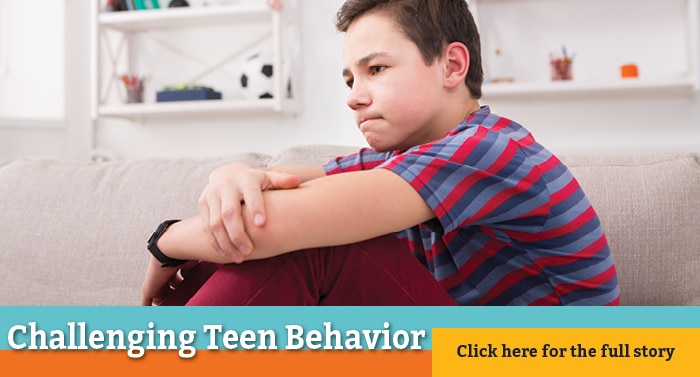By Sunshine Turner
Do you ever find yourself asking, how in the world will I make it through my child’s teen years? Are my teenager’s behaviors normal? If so, you are not alone. A basic understanding and awareness of what “normal” challenging teenage behaviors look like is the first step to surviving these sometimes-tumultuous years. That, and a whole lot of patience.
There isn’t a one-size-fits-all answer to the “what’s normal” question. There are multiple things to consider when trying to determine if your teen’s behavior would be considered “normal challenging behavior.” Things to consider include:
His/her/their age and the stage of puberty he/she/they are in: All too often, we forget or minimize the emotional impact hormones have on our developing teens. The beginning of puberty can bring a heightened state of the emotional roller coaster they experience during these years. Moodiness, anger, sadness, defiance, inability to “control” emotions and questioning authority are all common and generally “normal” parts of the puberty process. Knowing your teen well and nurturing open communication in your relationship will help you identify these factors.
Environmental factors: Grades, peer relationships, peer pressure, pressure to fit in and the overwhelming number of potential stressors this social media era has brought us. Is your teen getting enough sleep? Are you paying attention to their nutrition? Is there enough structure in their daily routine, or is there too much structure? Who are his/her/their friends? Are those relationships healthy? And don’t forget, you’ll want to look at all these things remembering that their hormones may be complicating some or all of how they’re handling these common daily factors. Throw additional unexpected life events into the mix and you just may have the recipe for some challenging behaviors that result from overwhelming emotions—which can in fact be considered “normal.”
Life Events: Breakups, friend drama, death of someone close, divorce or ending of parental relationships. This is another area parents can get caught forgetting or minimizing the significance of some of these life events. While we might not think our teen breakup is earth shattering, they sure do. Although we can see the other side of a breakup due to our life experience(s), teens don’t have that familiarity to center them. It’s also important to accept and respect that people experience these types of life events differently. Seeking to truly understand your teen’s experience is a strong first step in effectively supporting them during tough times. Not only do you want to understand why they do what they do, you’ll need to be understanding as well. Their emotional and behavioral responses to these types of events can vary in severity, yet still remain within the normal range.
So how do you know when to seek help? There isn’t a one-size-fits-all answer to this one either. This too, will vary from family to family and from situation to situation. Before we dive into an answer on this one, let’s cover some behavior basics to consider as you navigate these challenging situations. All behaviors have a function. Meaning, everything we do, we do for some reason. Our behaviors serve a purpose. Some good, some not so much. There’s a good chance your teen has no idea the function or reason for their behavior. Without stopping to intentionally figure it out yourself, you may not either. Behaviors that occur over time become habits. Again, some good, some not so good. That said, the more they occur the more of a habit they become.
My answer to the “when to seek help” question may seem shockingly simple, yet often times parents wait too long to do it. Simply stated, seek help whenever you don’t know what to try on your own or when what you’ve tried isn’t working. If you’ve implemented your own interventions or consequences over even a short period of time and they haven’t proven successful in improving or stopping the behaviors, ask for help. If your teen is engaging in risky behaviors that can impact their safety or the safety of others, and your efforts haven’t proven successful in stopping those behaviors, you should seek help from a professional. Other indicators of normal vs. abnormal behavior are things like: how frequently the behavior is occurring, the intensity of the behavior and how long the behaviors last. Also, consider whether your teen responds to interventions, redirection and/or consequences. A lack of response to such things could indicate something more serious is going on. Remember the longer and more frequently a particular behavior occurs, the stronger the habit becomes and the more difficult it is to address. Thus, the best piece of advice I have on this is: don’t wait too long. The sooner the better. Help can come in many forms. It can simply be consulting a friend or family member, someone you feel may have some insight or experience you don’t. Maybe someone you respect as having strong parenting interventions, such as a school counselor, teacher, administrator or someone from church. In some cases, a professional counselor or therapist. If at any time you are unsure, or if you’ve reached a point of needing additional help, find someone knowledgeable in teen behaviors and ask.
Even on the good days parenting teens can be hard. Parenting teens with challenging behaviors can feel overwhelming and hopeless at times. Remember, you are not alone. Our communities are full of caring support systems with individuals ready to help.
Sunshine Turner is the Director of Brief Intervention Programs for Devereux Advanced Behavioral Health Arizona. She has a background in Family Studies, was a former teacher and school principal and has worked in behavioral health with adolescents for the past 7 years.

